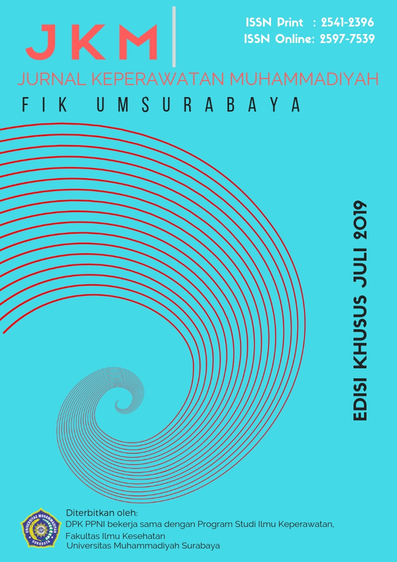Hubungan Kesegaran Jasmani Dan Sikap Kerja Dengan Keluhan Muskuloskeletal Pada Pengrajin Manik Kaca Di Jombang
DOI:
https://doi.org/10.30651/jkm.v4i2.2085Kata Kunci:
physical fitness, work posture and musculoskeletal complaintsAbstrak
Objective: to identify the relation between physical fitness and work posture with musculoskeletal complaints in glass bead worker in Jombang. One of the prosess in making glass bead were forming process. Workers in forming part worked in un ergonomic posture for 8 hours everyday. Health effects that arised as a result of an unergonomic worked postures are musculoskeletal disorders.Otherwise, physical fitness also could effect musculoskeletal disorder complaint
Methods: This article This research is an observational research with cross sectional approach design. The sample were 30 worker in forming part who fulfill inclusi category. Data were used Harvard Step Up Test, Rapid Entire Body Assessment (REBA), and filling out questionnaire Nordic Body Map (NBM). Correlation coeficient test was used to analyse the correlation between variables.
Results: Â There was a strong corelation physical fitness and musculoskeletal complaints and physical fitness (correlation coefficient = 0,611) and modetare correlation between musculoskeletal complaints and work posture (correlation coefficient = 0,577).
Conclusion: Based on the results of this study concluded that physical fitness and work posture were significantly related to musculoskeletal complaints. It is suggested to companies that provide picture of good work posture in workplace, so all workers would know about how to work with good posture.
Keywords: Â physical fitness, work posture and musculoskeletal complaints
Referensi
Bernard, B. P. 1997. Musculuskeletal Disorders and Workplace Factors: A critical Review of Epidemiologic Evidance for Work Related Musculoskeletal Disorders of the Neck, Upper Extremity, and Low Back. U.S Departement of Health and Human Services, PH service fo Disease Control and Prevention: National Institute For Occupational Safety and Health
Brouha, L.1943. The Step Test: A Simple Method for Measuring Physical Fitness for Muscular Work in Young Men. Res.Quart. 14, pp. 31-36.
Clarke, H dan David H.C. 1987. Application of Measurement to Physical Education. Amerika Serikat: Prentice-Hall.
Humantech. 1995. Humantech Applied Ergnomics Training Manual. Berkeley Vale Australia: Procter and Gamble Inc.
ILO, 2013. The Prevention Of Occupational Diseases. Tersedia di: http://www.ilo.org/wcmsp5/groups/public/---ed_protect/---protrav/---safework/documents/publication/wcms_208226.pdf [30 Oktober 2017]
Kuswana, dan Wowo S. 2016. Ergonomi Dan K3; Kesehatan Keselamatan Kerja. Bandung: PT. Remaja Rosdakarya
Sudarno, S.P (1992). Pendidikan Kesegaran Jasmani. Jakarta: Dekdikbud Dirjen Dikti
Sugiharto. 2000. Pendidikan Kesegaran Jasmani. Jakarta: Depdikbud
Suma’mur. 2014. Higiene Perusahaan Dan Kesehatan Kerja (HIPERKES). Jakarta: CV. Sugeng Seto
Tarwaka. 2015. Ergonomi Industri; Dasar-Dasar Pengetahuan Ergonomi Dan Aplikasi Di Tempat Kerja. Surakarta: Harapan Press
Unduhan
Diterbitkan
Terbitan
Bagian
Lisensi
- Penulis tetap memegang hak atas karyanya dan memberikan hak publikasi pertama kepada jurnal ini yang secara simultan karya tersebut dilisensikan di bawah:Â Creative Commons Attribution-ShareAlike 4.0 International (CC BY-SA 4.0)













